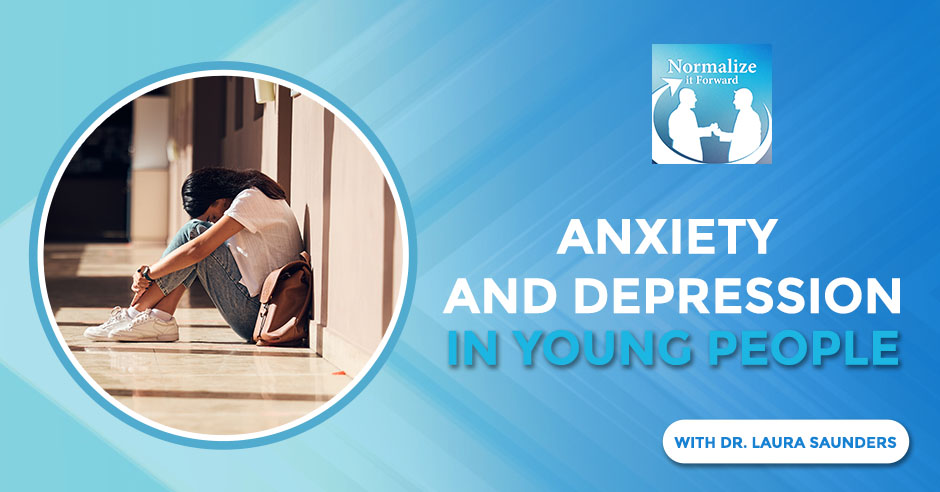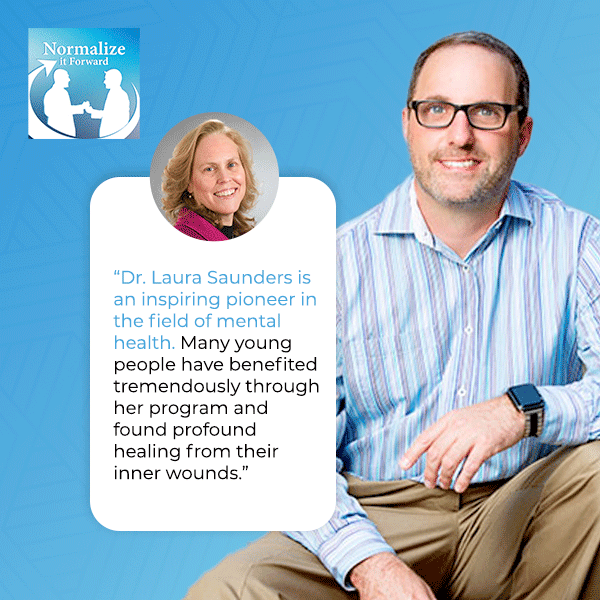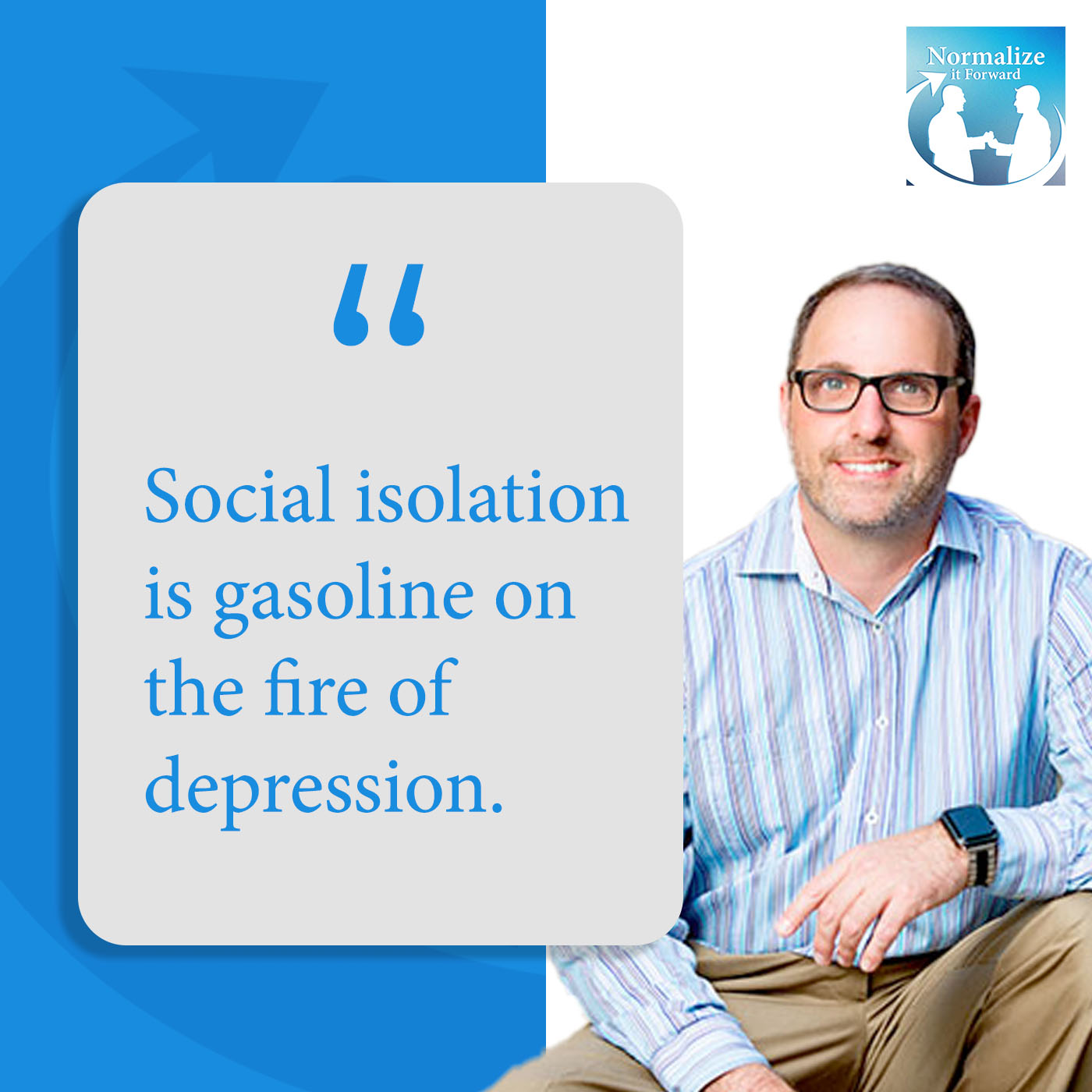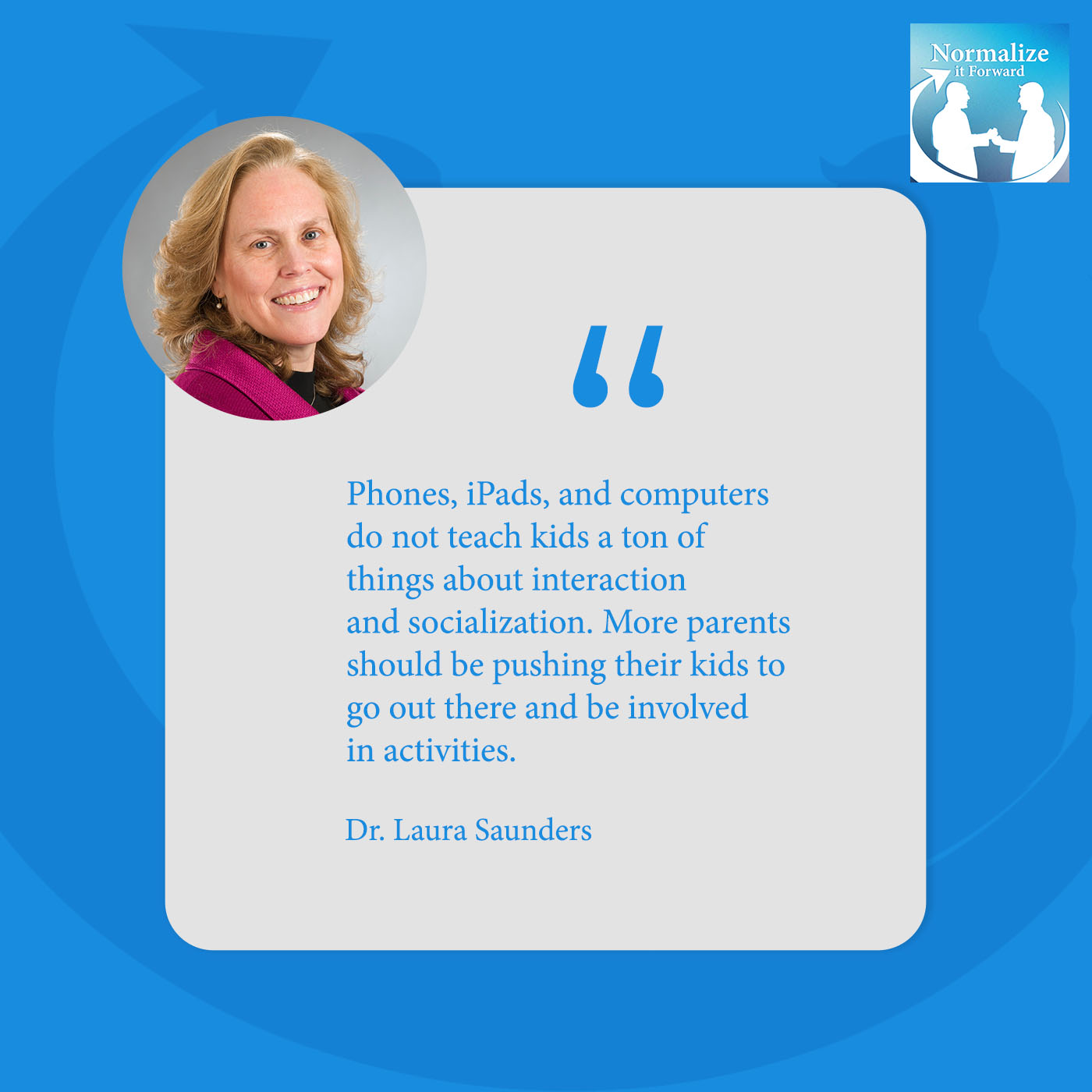
The rising number of young people struggling with anxiety and depression in this post-pandemic world is alarming. Social media and the rapid evolution of technology are not helpful to this unfortunate reality as well. Marc Lehman sits down with Dr. Laura Saunders, a staff psychologist at the Institute of Living/Hartford Hospital, to discuss how parents should guide young people in dealing with their inner battles. They talk about the hidden benefits of allowing children to experience failure and the importance of encouraging them to leave their comfort zone. Dr. Laura also delves into the dangers of social media, particularly how it pushes the youth to embrace and normalize the culture of comparison and isolation.
—
Watch the episode here
Listen to the podcast here
Anxiety And Depression In Young People With Dr. Laura Saunders
Welcome, everybody. Welcome to the show that openly talks about mental health and wellness. I am super excited to welcome Dr. Laura Saunders. Welcome, Laura.
Thank you.
She is a staff psychologist working at the Institute of Living here in Hartford at Hartford Hospital. She’s a Director of the new initiative, the Center for Gender Health, at Hartford Healthcare. Dr. Saunders, in 2015, was named the Employee of the Year by Hartford Hospital. In 2019, Dr. Saunders was the recipient of the Ned Graffagnino Award for distinguished service in the area of community-oriented work and collaboration with other mental health professionals.
Her areas of expertise include LGBTQ, mental health, child psychopathology, behavioral management, parent training, and family therapy. Laura also appears regularly in local TV news to provide psychological commentary on various topics relevant to youth and family. She has two segments called Checking In on WFSB Channel 3, the Great Day Connecticut Show, related to child and family Health. Dr. Saunders, thank you so much for spending some time with us. How are you?
I’m doing well. How are you?

Dr. Laura Saunders’ Mental Health Program
Fantastic. I’m super excited to speak with you. The topic of mental health and wellness is certainly near and dear to both of us with the work that we do. I would love to start off, if it’s okay, by talking with you about what it is that you do specifically at the Institute of Living and telling us a bit about your program.
I want to give a little background because that helps give it a little bit more context. In the early part of my career, I spent about eighteen years in a child and adolescent inpatient unit here at the Institute of Living. I was working with all children and adolescents with moderate to severe psychopathology. That’s where I got my core understanding of trauma and complex trauma and how waves of issues affect our young people.
From there, I started a program at the Institute Living, an intensive outpatient program specifically for LGBTQ youth and young adults. That was a sideline expertise that I’d had for a long time, and then they tapped me to start this program. The division of Young Adult Services here is working on creating specialty tracks to meet more specific needs.
From there, I saw the need for trans and gender-diverse folks to support them in their medical transition. In the beginning, I was making all referrals for medical transition outside the Hartford Hospital and Hartford Healthcare System. I said, “This doesn’t make any sense to me. We’re a large hospital system. Am I making all these referrals outside of the hospital?”
From that point, I began the work. I did some leadership training, got to know the system a lot better, and began the work of developing this new initiative at Hartford Healthcare. We call it the Center for Gender Health. It’s to support trans and gender-diverse individuals, teens, young adults, and adults stepping into their medical transition. We offer a multidisciplinary clinic that has primary care, endocrinology, psychiatry, and psychology. We make referrals for plastic surgery, urology, GYN care, voice therapy, and rehab. We do a lot of work in supporting our young people.
Post-COVID Increase In Anxiety And Depression
Amazing work. Being a local clinician in the area, I have to say I consider myself really lucky to have access to a program like that. I see you as a pioneer in that field, creating this program and recognizing the need. I’m sure many young people who have come through benefited tremendously. It’s amazing. You and I have been doing this for quite some time. In our careers, things have changed a bunch. Certainly, on a general level, both you and I have seen anxiety and depression go up tremendously in the last couple of years. I’ll ask you a really big question. I’m curious. What goes into that? What do you think are some of the factors that have led to such an increase?
I am a big podcast listener. I love to listen to podcasts from all different kinds of people. There was a podcast that I had listened to a while back that talked about the change in the trajectory of parenting and mental health. It started in the ‘90s with this concept of stranger danger. There were movies about it. It created this phenomenon where parents became hypervigilant about their children.
When I grew up, and certainly probably when you grew up too, in the summer on the weekends, I would leave the house in the morning, go out, venture through the neighborhood, and find people to play with or play semi-organized games of kickball, softball, or whatever else we wanted to do. I had a tremendous amount of freedom as a young person. That also meant that, not so much for me, but my brothers made a lot of dumb mistakes. That’s how you learn. You learned a lot from that.
I wasn’t necessarily coming back and reporting to my parents all the things that I did nor did they ask, but this concept of stranger danger changed that trajectory. It made parents believe, and falsely believe, that the world’s a dangerous place. I’m also taking into account here that not a week goes by where we don’t hear about a school shooting or other kinds of things. Those are some bigger contextual social issues that are not being well addressed, but that’s probably not for this show.
That’s where this whole concept of the play date came out. I’m not going to let my child roam free. I want to arrange a date for them where someone comes to our house or my child goes to their house and they play for a prescribed period of time. It changed the worldview of a lot of people. In that, it created a lot of restrictions and also deficits in socialization. I do a lot of work certainly with trans youth, but even my private practice and the segments I do on Channel 3 WFSB talk about general child mental health. I have seen it change drastically in the last couple of years. It honestly got, and I’m sure you saw this as well, significantly worse during COVID.
You make a great point. I hadn’t quite thought of it in that context, so I appreciate you bringing that up. From our parents’ generation to our generation of parenting, there’s been a really different perspective on things. That has certainly translated and been handed down to the generation of youth who oftentimes don’t experience things nearly the same as we did when we were kids.
When they’re experiencing anxieties, they’re highly sensitive. Many young people haven’t had their first real stressor sometimes until their senior year of high school when they don’t get into the right college. Having done this for many years, I continue to be surprised by that because, to me, it feels late to be experiencing that type of stuff. Certainly, COVID had a huge impact on all of this.
How Young People Should Deal With Stressors
Certainly, as we’re looking through our high schools and our colleges, there are so many kids out there with major stressors. Some kids have been diagnosed with anxiety and depression and some kids have not, but the majority of the kids are feeling it. They’re feeling that level of stress. I’m wondering. In your work with young people, what are some of the things that young people can do to combat those types of stressors?
It’s twofold. Sometimes, they’re not hitting some of their major challenges in senior year in high school. I think to myself, “Why is that?” It’s the concept of what they call the helicopter parent or the lawnmower parent. There are generational backlashes, but many parents prevent bad things from happening to their children. I’m not talking about safety issues. Safety issues need to be addressed always. I’m talking about a lot of the little failures that happen, like getting cut from a team or having some negative peer interactions. I’m not talking about bullying. I’m talking about regular, typical everyday conflicts between kids that they need to sort out on their own. If it reaches a safety level, that’s a different standard.
You’re saying experience, like having the experience and getting through it.
You have to experience those disappointments and failures because that’s where a lot of the learning takes place. I know that you have seen this because this is the work that you’re doing, but I hear anecdotally about so many young people going off to college and having significant adjustment issues. The first year of college for kids that go away to school or even kids that commute to school is one of the biggest adjustment periods in early development but they’re having worse problems because they don’t know how to manage some of the stressors.
You have to experience disappointments and failures. That’s where a lot of learning takes place. Share on XOne of the big things also has to do with this huge surge in young people diagnosing themselves with social anxiety and then believing that the cure for social anxiety is to stay at home, do online things, or play video games. That is not how you manage social anxiety. I’m not saying to throw your young person into a den of people and make them talk to every single person. It’s the social isolation that happens in this world that we’re in where so many friendships are online or so much of their free time is through video games that they don’t learn the skills of social interaction. Social isolation is gasoline on the fire of depression. We really need to look out for how we can better challenge our young people to have more of those skills because that’s the only way that you’re going to be able to deal with the challenges of life.

I found myself saying a lot with young people in school when we were learning how to do math, for example, “Part of the learning process is making mistakes. Eventually, you master it and then you move on to whatever the next complex math would be.” For some reason, there’s been this detour socially with young people.
I agree with you. The concept of isolation has been really horrible for so many kids. If I could twist some of what you said into this concept of what parents can do, what I’m hearing you say is what parents can do is force kids to be more out there, whether it be hanging out with other kids, joining clubs or activities, trying to figure out what they enjoy and what they don’t, maybe getting a part-time job as they get a little bit older, which I don’t see kids doing anymore, or dealing with a tough customer. Those are experiences that teach them things and to be able to become resilient and come back from that so that they’re not thrown completely off base when they’re dealing with stuff like that.
The suggestion is a helpful one. I really want parents in my audience to pay attention because this type of stuff starts at home. It starts with parents saying, “What can we do?” Devices, whether it be phones, iPads, or computers, don’t teach kids a ton of things. Certainly, they don’t teach kids about interaction and socialization. More parents should be pushing their kids to be out there and to be involved in activities.

What social media has done for a lot of young people is it has created this comparison culture. I have all these little phrases. Comparison is the thief of joy. If I see that someone had this fantastic weekend and they get along great with everyone and do all these fun things, and then here I am, I was at home and I cleaned all weekend, that comparison as a general rule makes us feel bad about ourselves.
Comparison is the thief of joy. Share on XFor young people, it’s what they see through all these social media apps like Snapchat. You look on Snap Maps and realize that three of your friends are in the same place and you weren’t invited. That creates this sense of like, “What is wrong with me? Why don’t people like me?” Sometimes, you can’t invite everyone. You have to manage those things. Sometimes, as adults, we don’t get invited to every dinner party and gathering. We have to learn to manage those things.
The Many Challenges Of Parenting Today
I say all the time that parenting is the hardest job. Honestly, parenting young people in this day and age is particularly hard. It has different challenges than it did many years ago. It is the hardest job. I ‘m a huge proponent of getting a part-time job. Once you’re sixteen years old, you get a part-time job. Not only is it a little bit of money in your pocket, which equals independence, but it is also dealing with people and life challenges. We’re not talking about high-level jobs. We’re talking about working at the local grocery store and doing something that gets you out of the house and creates challenges for you to have to manage.
I’m so glad you said that. You made two really important points I want to touch on. One is parents pulling back, which is so hard for some parents but necessary. If you’ve got a kid who’s college-bound and they’re a sophomore or junior and they’re growing but you’re still doing way too much for them, you have to, as a parent, question how they are possibly going to be ready to leave your house in a year and a half. I see some parents keep doing that, and then their kid graduates and they think magically that their kids are going to learn how to do these things. It is a real struggle. It is more of a struggle for a kid who has a parent doing everything for them when they go to college than vice versa, in my opinion.
This is not meant to criticize. Parents act with the best of intentions. As a sociological study, in my generation of kids growing up, we were so independent. We want to lessen some of the challenges and burdens for our kids. It’s coming from a good place, but those challenges and those burdens are really where all the learning takes place.
I do worry a lot about young people because I do think it’s harder. This is where social media has made life a lot harder. There are different challenges, but it’s doing something outside of your comfort zone. I love sports for young people, but if you’re not into sports, join a painting class, the chess club, the robotics team, the Italian club, or the Spanish club. Do something that’s outside your comfort zone a little bit and makes you interact with people that you wouldn’t typically interact with. It is doing things that are outside your comfort zone and for parents to actively encourage that.
Nowadays, living is a lot harder for young people. Share on XIf you’re a parent out there and you have a kid who says, “No,” at every turn, continue to come up with and brainstorm ideas. There will be something out there that they have a little interest in. You give them a little bit of a push to say, “Go to this painting class. See what you think,” or, “Go to this photography class. See what you think.”
The Right Management Of Social Media
I’ve seen it hundreds of times over the years where kids will do those things and, all of a sudden, they find something that they’re passionate about or, even better, kids there that they connect with, which is awesome. You mentioned social media a few times. I wanted to touch on that. I feel like that is probably at least a ten-hour conversation we could have about how it’s affecting kids.
One gentleman I interviewed a few months ago was talking about the impact of Instagram and how that seems to really affect females in particular. It creates this culture of comparison, this culture of needing to look a certain way and act a certain way, and that whole conversation around likes, follows, and all of that and how that impacts self-worth. It’s a huge topic but I want to talk to you for a few minutes about social media. Are there any suggestions as a parent and a clinician you might have for parents around the management of social media?
It starts with, as much as possible, delaying when kids get smartphones. Once they have a smartphone that connects to the Wi-Fi and the internet, they can have access to most things. Let’s face it. Young people are smarter about technology than their parents. Even if you put all sorts of parental controls on, they get around things and they do it in such a way that you’re like, “How the heck did you get that? I thought I blocked it.”
Young people are smarter about technology than their parents. They can easily get around parental controls in their mobile devices. Share on XThere are a lot of movements out there. Wait Until 8th is one of them. They have different websites not letting your children get smartphones until they’re thirteen years old. The 13-year-old brain is not a well-thinking brain, but at least it’s better than someone getting at age 10. It is waiting as long as you can and also trying to have some open dialogue about the things that they’re seeing.
I worked with someone one time who was a thirteen-year-old. They did have a phone and they desperately wanted Snapchat. The mom would block them and then they would find a way around it. They would get on it and then they’d lose their phone for a period of time, and then they’d be upset. The reality is that is the way young people communicate with each other.
They don’t do what I did, which was we had one phone with a long extension cord in the kitchen. If I wanted to talk to my friend in high school, I had to sit in the dining room with a long cord and talk in the dining room. Talking on the phone was the way that we communicated. The way young people communicate is through social media.
She would take her phone away for a protracted period of time so she’d have no way to contact friends, and then she’d become more angry and irritable. It was this cycle. I said, “How can we manage this differently?” If she wants this app, you’re on it with her and you’re monitoring it. Instead of banning things, because then they circumvent it, you’re on it too. Anything that she sends has to be sent to you also. It is finding more creative ways to manage things because putting a ban on something often means they’re going to sneak and get it anyway. Finding more creative ways as parents to delay, monitor, or create open dialogues is the better way to deal with all of this.
We need to get to that acceptance place where kids have that mode of thought around technology and will always be ahead of us on some of that. One of the best things I’ve heard so far since I started this show is when I had a mom reach out to me and she said, “We read one of your interviews, me and my fifteen-year-old together, and it created an open conversation around mental health.” I thought, “How awesome.”
That’s why I created this. I want people to have these open conversations. Part of that is social media and getting kids to understand that as much as it has its positive components, there’s a downside to it. There’s a reason why the Sergeant General put out their warning about it and its impact on young people and their mental health.
Dr. Laura’s Nominee For Next Guest And Closing Words
I appreciate your suggestion. It’s a good middle-of-the-road. It’s a good way for parents to create, “We can have this, but we need to have it in a safe fashion in the house.” Along those lines, one of the things that I often ask people that come on is for them to nominate a friend, a coworker, or a relative to keep the conversation going. You’ve been so kind with your time, energy, and suggestions. Any thoughts in terms of who you’d like to nominate for one of our future shows?
I’d like to nominate a colleague of mine, Dr. David Bendor. He’s a psychologist here at the Institute of Living. He runs our medical track in Young Adult Services. That is the combination of young people who have medical issues, whether it be diabetes, Crohn’s disease, or any number of different things, and then have co-occurring mental health issues. He looks at the way that medical and psychological issues blend. The reality is a lot of young people don’t have the words necessary to express how they feel, so it isn’t pretty common that somatic complaints are the way that young people express how they feel. Understanding the interplay between medical issues and psychological issues is critical.
Many young people do not have the words necessary to express how they feel. They turn to somatic complaints to reveal their feelings. Share on XI know Dr. Bendor really well. I appreciate that nomination. David, you’re up next. Two pioneers in the field, Laura, with yourself, and certainly, David Bendor. If IOL doesn’t know it yet, they should. I appreciate you nominating him. I want to thank you for your time and energy. I know you’re super busy. Your thoughts on these topics and subjects are so helpful. Thank you for being here. I really appreciate it.
Thank you for having me.
Have a wonderful day. Take care.
Thank you.
Important Links
About Laura Saunders
 Laura M. I. Saunders, Psy.D. ABPP is a staff psychologist working at the Institute of Living/Hartford Hospital. She is also Board Certified in Clinical Psychology. She is the Director of the new initiative, the Center for Gender Health at Hartford Healthcare In 2015, Dr. Saunders was named the Employee of the Year for Hartford Hospital.
Laura M. I. Saunders, Psy.D. ABPP is a staff psychologist working at the Institute of Living/Hartford Hospital. She is also Board Certified in Clinical Psychology. She is the Director of the new initiative, the Center for Gender Health at Hartford Healthcare In 2015, Dr. Saunders was named the Employee of the Year for Hartford Hospital.
In 2019, Dr. Saunders was the recipient of the Ned Graffagnino Award for distinguished service in the areas of community-oriented work and collaboration with other mental health professionals. Areas of expertise include LGBTQ mental health, child psychopathology, behavior management, parent training and family therapy.
She appears regularly in local TV news to provide psychological commentary on topics relevant to youth and families and currently has two weekly segments called “Checking In” on WFSB/Ch.3, the Great Day CT show, related to child and family mental health.
